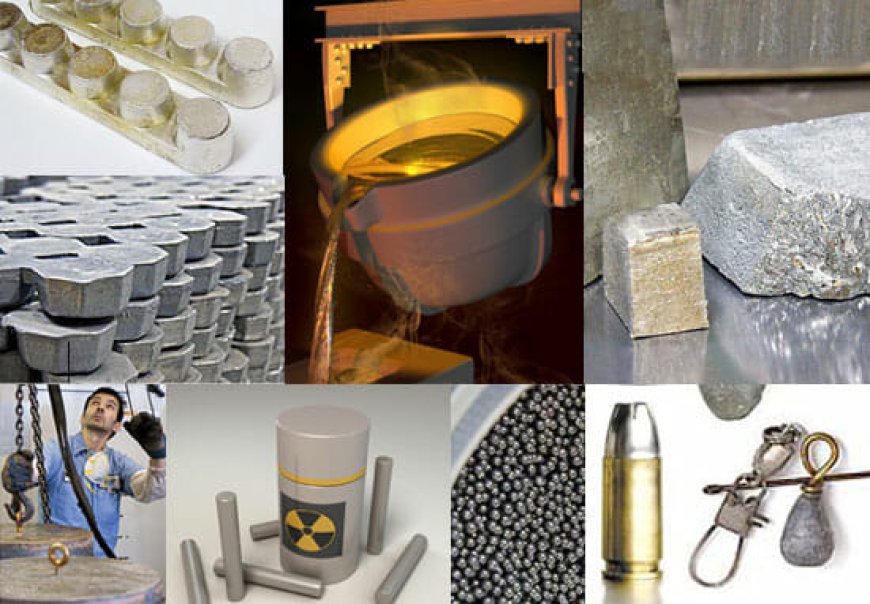Durable and Customizable Alloys of Lead for Industrial Performance
Nuclead manufactures and supplies a comprehensive range of lead alloys engineered for industrial use. An alloy of lead is created by combining pure lead with one or more metals—such as antimony, tin, calcium, or silver—to modify characteristics like hardness, melting point, corrosion resistance, and strength.

Nuclead manufactures and supplies a comprehensive range of lead alloys engineered for industrial use. An alloy of lead is created by combining pure lead with one or more metalssuch as antimony, tin, calcium, or silverto modify characteristics like hardness, melting point, corrosion resistance, and strength. These enhanced properties make lead alloys essential in applications like casting, ammunition, radiation shielding, bearings, and structural counterweights.
With decades of metallurgical experience, Nuclead offers both standard and custom lead alloy formulations tailored to meet industry-specific standards. From high-volume manufacturing to prototype development, all lead alloys are processed in-house to ensure consistency, purity, and reliability.
Types of Lead Alloys Offered
Nuclead provides a variety of lead-based alloys suitable for technical and industrial applications. Each alloy is available in the form of ingots, bars, cast shapes, billets, or custom machined components.
Lead-Antimony Alloy
Lead-antimony alloys are widely used in applications requiring increased hardness and structural strength. By adding antimony to lead, the resulting alloy becomes more rigid and wear-resistant.
-
Common antimony concentrations: 2% to 6%
-
Used in battery grids, bullets, bearings, and counterweights
-
Excellent machinability and castability
-
Withstands environmental stress and repeated impact
Lead-Tin Alloy
Adding tin to lead creates an alloy with improved ductility, corrosion resistance, and a lower melting point. This alloy is commonly used for soldering and specialty casting.
-
Ideal for electronic solder and sealants
-
Also used in radiation shielding with enhanced flexibility
-
Lead-tin blends range from 60/40 to 90/10 compositions
-
Smooth flow and bonding during melt
Lead-Calcium Alloy
Lead-calcium alloys are known for their strength and resistance to corrosion, making them ideal for grid applications in batteries and energy storage systems.
-
Common in maintenance-free battery manufacturing
-
Offers dimensional stability over long-term use
-
Performs well under thermal cycling
-
Low hydrogen evolution in electrolytic environments
Lead-Silver Alloy
This alloy is used in high-performance electrochemical and metallurgical applications. Silver improves strength and conductivity.
-
Used in electroplating, high-purity refining, and aerospace
-
Often combined with calcium or tin for enhanced properties
-
Resists cracking and fatigue under electrical stress
-
Suitable for lead-acid battery terminal posts and busbars
Custom Lead Alloys
Nuclead also formulates and casts custom lead alloys to meet exacting specifications required in niche applications.
-
Tailored for hardness, melting point, density, or chemical resistance
-
Developed in consultation with engineers and metallurgists
-
Cast into custom ingots, bars, or finished parts
-
Ideal for research, prototyping, or product development
Applications of Lead Alloys
Lead alloys are essential in environments where strength, durability, weight, or shielding is critical. Their use spans across many industries, from military and marine to healthcare and construction.
Ammunition Manufacturing
Lead-antimony and lead-tin alloys are standard materials in commercial and military-grade ammunition.
-
Bullets and shot formed from lead-antimony for hardness
-
Lead-tin combinations for precision casting of specialty rounds
-
Alloys ensure weight consistency and ballistic performance
-
Corrosion-resistant finishes extend shelf life and usability
Battery Production
Both lead-antimony and lead-calcium alloys are essential in the grid systems of automotive and industrial batteries.
-
Increased rigidity for repeated charge cycles
-
Minimized gassing and electrolyte interaction
-
Enhanced conductivity and long-term stability
-
Common in VRLA, AGM, and sealed batteries
Radiation Shielding
Lead alloys are used in medical, nuclear, and industrial shielding where flexibility and strength are required.
-
Lead-tin or lead-antimony used in x-ray and gamma radiation barriers
-
Cast into bricks, sheets, or molded forms
-
Higher strength allows for structural use as well as shielding
-
Less prone to deformation under heat or vibration
Casting and Mold Making
Foundries and casting companies use lead alloys for consistent pours, detail capture, and low shrinkage rates.
-
Lead-tin provides excellent flow for small part casting
-
Lead-antimony offers hardness for reusable molds
-
Used in weights, seals, cable sheathing, and ornamental castings
-
Allows tight control over dimensional tolerances
Structural and Mechanical Balancing
Lead alloys provide dense counterweight solutions with improved impact resistance.
-
Elevator weights, industrial dampers, and marine ballast
-
Alloys maintain form under vibration and pressure
-
Encapsulation available for safety or hygiene-sensitive applications
Material Characteristics and Benefits
Each alloy of lead brings unique attributes to the end product, depending on the metals used in the blend. Nuclead engineers ensure all materials are formulated to exact standards and tested before shipping.
Key Performance Traits
-
Hardness: Increased resistance to deformation, ideal for structural or impact applications
-
Malleability: Retains some formability even in alloyed states
-
Corrosion Resistance: Performs well in wet, acidic, or marine environments
-
Radiation Attenuation: Alloys maintain shielding properties
-
Machinability: Easily drilled, cut, or shaped with standard tooling
Alloy Selection Based on Use
| Application | Recommended Alloy | Key Properties |
|---|---|---|
| Ammunition | Lead-Antimony | Hardness, consistency, impact durability |
| Soldering | Lead-Tin | Smooth melting, bonding, corrosion resistance |
| Batteries | Lead-Calcium | Dimensional stability, low gas emission |
| Radiation Shielding | Lead-Tin or Lead-Antimony | Strength with flexibility |
| Casting & Molding | Lead-Tin | Flowability and detail capture |
| Marine Ballast | Lead-Antimony | Density with surface resilience |
Custom Fabrication and Finishing Options
Nuclead offers full in-house fabrication services for lead alloy products. Whether you need alloy ingots, billets, or complex machined components, the process is streamlined to deliver fast results with minimal waste.
Forms Available
-
Ingots and bars
-
Round stock and billets
-
Custom cast shapes
-
CNC-machined parts
Secondary Processes
-
Drilling, threading, and slotting
-
Encapsulation in vinyl, steel, or epoxy
-
Stamping, engraving, and part labeling
-
Bonding to other metals or surfaces
Packaging, Delivery, and Support
Lead alloys are packaged securely to ensure safety, traceability, and ease of use. Nuclead serves both large-scale industrial buyers and smaller custom orders with equal reliability.
Packaging Options
-
Palletized ingots and bars
-
Crated custom shapes
-
Moisture-protected wraps
-
Labeled by alloy type and composition
Shipping and Logistics
-
Domestic and international delivery
-
Expedited freight available
-
Drop-shipping to job sites or production facilities
-
Tracking and coordination with receiving teams
Quality Assurance and Safety
All alloy production at Nuclead follows strict internal and regulatory quality controls to ensure performance and compliance.
-
ISO-certified processes
-
OSHA- and EPA-compliant handling
-
MSDS and COA documentation available
-
Lead-free and RoHS-compliant options on request
Why Choose Nuclead for Lead Alloy Supply?
Nuclead is a trusted partner for precision lead alloys, serving manufacturers, contractors, defense agencies, laboratories, and OEMs. With full production capabilities, deep inventory, and engineering support, Nuclead offers an unmatched level of service and flexibility.
Benefits of Working with Nuclead
-
Custom alloy development and consulting
-
High-volume or small-batch availability
-
Proven performance across industries
-
Decades of metallurgical and fabrication expertise
-
Nationwide shipping and responsive customer care
Request a Quote for Lead Alloys Today
If you need a reliable supplier of high-performance lead alloys, Nuclead provides the expertise, inventory, and customization to meet your projects requirements. From standard grades to complex blends and cast shapes, contact Nuclead today to request a quote and speak with a lead alloy specialist.





































